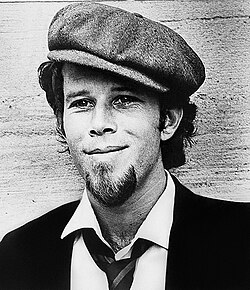Tom Waits Quote
My kids are starting to notice I'm a little different from the other dads. "Why don't you have a straight job like everyone else?" they asked me the other day. I told them this story: In the forest, there was a crooked tree and a straight tree. Every day, the straight tree would say to the crooked tree, "Look at me...I'm tall, and I'm straight, and I'm handsome. Look at you...you're all crooked and bent over. No one wants to look at you." And they grew up in that forest together. And then one day the loggers came, and they saw the crooked tree and the straight tree, and they said, "Just cut the straight trees and leave the rest." So the loggers turned all the straight trees into lumber and toothpicks and paper. And the crooked tree is still there, growing stronger and stranger every day.
My kids are starting to notice I'm a little different from the other dads. "Why don't you have a straight job like everyone else?" they asked me the other day. I told them this story: In the forest, there was a crooked tree and a straight tree. Every day, the straight tree would say to the crooked tree, "Look at me...I'm tall, and I'm straight, and I'm handsome. Look at you...you're all crooked and bent over. No one wants to look at you." And they grew up in that forest together. And then one day the loggers came, and they saw the crooked tree and the straight tree, and they said, "Just cut the straight trees and leave the rest." So the loggers turned all the straight trees into lumber and toothpicks and paper. And the crooked tree is still there, growing stronger and stranger every day.
Related Quotes
About Tom Waits
Tom Waits was born and raised in a middle-class family in Pomona, California. Inspired by the work of Bob Dylan and the Beat Generation, he began singing on the San Diego folk circuit. He relocated to Los Angeles in 1972, where he worked as a songwriter before signing a recording contract with Asylum Records. His debut album was Closing Time (1973), followed by The Heart of Saturday Night (1974) and Nighthawks at the Diner (1975). He repeatedly toured the United States, Europe and Japan, and found greater critical and commercial success with Small Change (1976), Blue Valentine (1978) and Heartattack and Vine (1980). During this period, Waits entered the world of film, acting in Paradise Alley (1978), where he met Kathleen Brennan.
In 1980, Waits married Brennan, split from his manager and record label, and moved to New York City. With Brennan's encouragement and frequent collaboration, he pursued a more eclectic and experimental sound influenced by Harry Partch and Captain Beefheart, as heard on the loose trilogy Swordfishtrombones (1983), Rain Dogs (1985) and Franks Wild Years (1987). In 1990, he collaborated with theater director Robert Wilson on the musical The Black Rider, the songs for which were released on the album of the same name. Waits and Wilson reunited for the musicals Alice (1992) and Woyzeck (2000). In 2002, the songs from them were released on the albums Alice and Blood Money. Waits won Grammys for Best Alternative Music Album and Best Contemporary Folk Album for Bone Machine (1992) and Mule Variations (1999). Waits went on to release Real Gone (2004), the compilation Orphans: Brawlers, Bawlers & Bastards (2006), the live album Glitter and Doom Live (2009) and Bad as Me (2011).
Waits has influenced many artists and gained an international cult following. His songs have been covered by Bruce Springsteen, Tori Amos, Rod Stewart and the Eagles and he has written songs for Johnny Cash and Norah Jones, among others. In 2011, he was inducted into the Rock and Roll Hall of Fame. Introducing him, Neil Young said "This next man is indescribable, and I'm here to describe him. He's sort of a performer, singer, actor, magician, spirit guide, changeling..." Accepting the honor, Waits mused: "They say that I have no hits and I'm difficult to work with. And they say it like it's a bad thing!"
